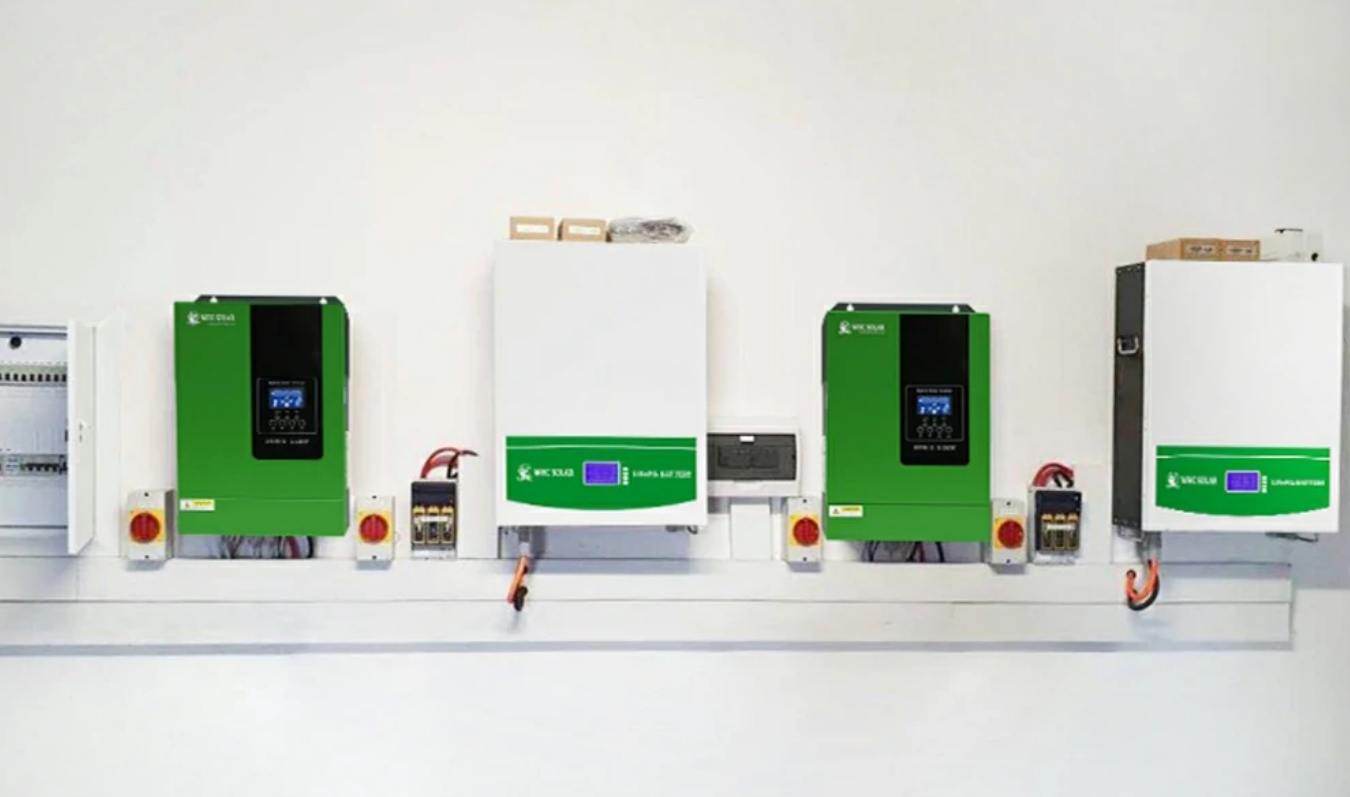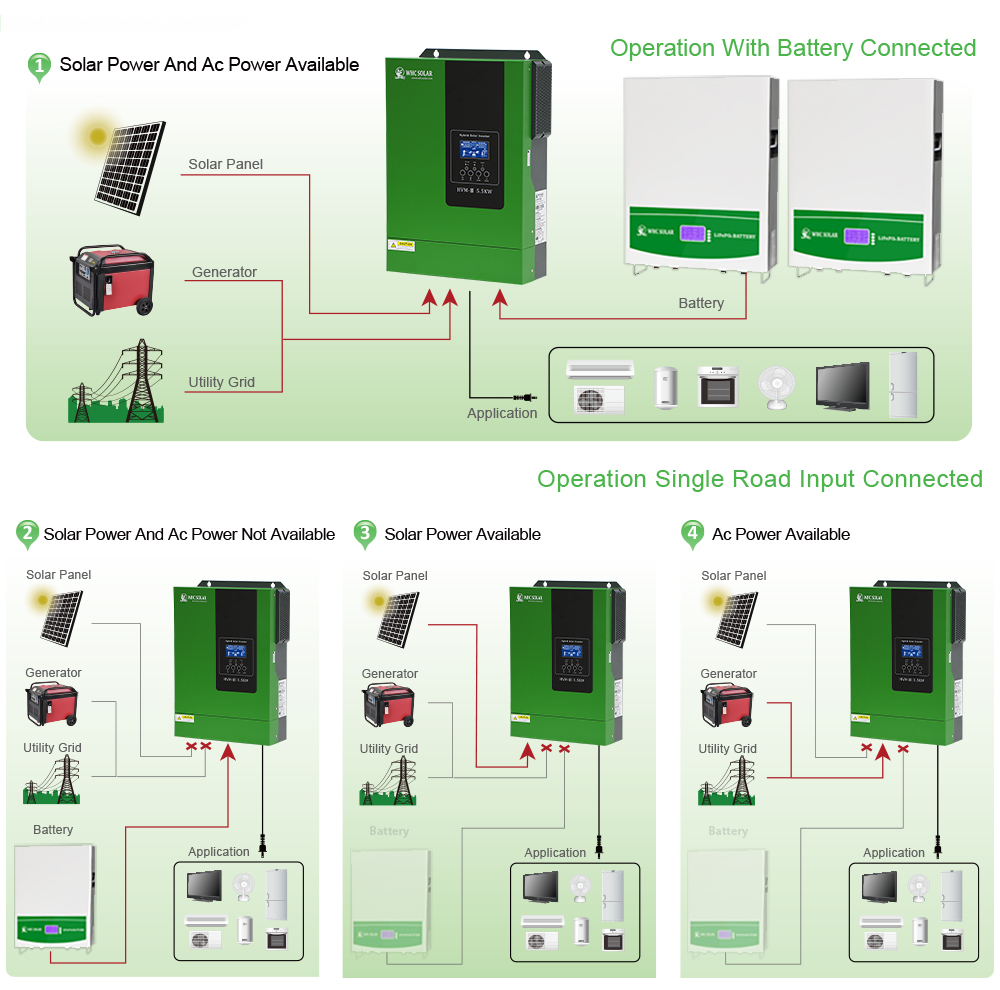As the global spotlight on sustainable energy solutions intensifies, the paradigm shift towards cleaner and more efficient power sources has never been more pronounced. The hybrid solar inverter is at the forefront of this green revolution, a technological marvel that seamlessly blends the best of solar and conventional energy, ushering in a new era of energy independence.
Welcome to WHC, your trusted companion in the realm of solar solutions. Today, we begin an enlightening journey into the core of hybrid solar inverters, uncovering the details that make them the foundation of modern renewable energy systems.

What is a Hybrid Solar Inverter?
A hybrid solar inverter is a device designed to manage and integrate both solar power and grid electricity within a single system. Its primary function is to optimize the utilization of solar energy generated by photovoltaic (PV) panels while also seamlessly interacting with the electrical grid when necessary.
The key feature of a hybrid solar inverter lies in its ability to intelligently switch between different power sources based on the availability of solar energy and the energy demands of the connected appliances or devices. During periods of ample sunlight, the inverter prioritizes using solar power to meet the electrical needs of the premises. Excess energy generated by the solar panels can be stored in batteries for later use or fed back into the grid, depending on the system configuration.
Conversely, when solar energy production is insufficient, the hybrid inverter smoothly transitions to drawing power from the grid to ensure a continuous and reliable electricity supply. This seamless transition prevents disruptions and ensures a constant power supply even during periods of low solar irradiance or nighttime.
Additionally, many hybrid solar inverters offer advanced monitoring and control features, allowing users to track energy production, consumption patterns, and overall system performance. This enables better management of energy resources, cost savings, and a reduced environmental footprint by maximizing the use of clean, renewable solar energy. Overall, a hybrid solar inverter plays a crucial role in creating a flexible and sustainable energy system by efficiently integrating solar power and grid electricity.
How Hybrid Solar Inverters Work?
Hybrid solar inverters operate through a sophisticated process that involves managing the generation, storage, and distribution of electricity from both solar panels and the grid. These inverters are equipped with dual functionalities, serving as both a solar inverter and a battery inverter. When sunlight strikes the solar panels, the photovoltaic cells convert the solar energy into direct current (DC) electricity. The solar inverter component of the hybrid inverter then transforms this DC electricity into alternating current (AC), which is the form of electricity used in homes and businesses.
Simultaneously, the hybrid solar inverter monitors the energy demand of the connected appliances or devices. If the demand is less than the solar energy being produced, the excess electricity is directed to charge energy storage systems, typically batteries. These batteries act as a reservoir, storing surplus energy for later use, such as during periods of low sunlight or in the evening when the solar panels are not generating electricity.
During times when solar energy production is insufficient to meet the electricity demand, the hybrid inverter seamlessly switches to drawing power from the grid. This transition is imperceptible to users, ensuring a continuous and reliable power supply. Some advanced hybrid solar inverters also can prioritize the use of stored energy from batteries before resorting to grid power, further optimizing self-consumption and reducing reliance on external sources.
The overall operation of a hybrid solar inverter is orchestrated by sophisticated control algorithms that constantly assess the energy availability, demand, and storage levels. This intelligent management allows for the efficient utilization of solar power, maximizes self-consumption, and provides a reliable and stable electricity supply by seamlessly integrating both solar energy and grid power into a unified and responsive energy system.

Benefits of Hybrid Solar Inverter:
Hybrid solar inverters entertain its users with numerous benefits. Few are listed hereunder:
1. Reduced Electricity Bills:
One of the primary benefits of using hybrid solar inverters is the potential for significant cost savings on electricity bills. By harnessing solar power during sunny periods, users can offset their reliance on grid electricity, leading to lower energy expenses over time. The ability to seamlessly switch between solar and grid power ensures a continuous and reliable energy supply, preventing the need for excessive grid consumption.
2. Energy Independence:
Hybrid solar inverters contribute to achieving a degree of energy independence for users. By generating electricity from solar panels and storing excess energy in batteries, individuals and businesses can rely less on external power sources. This increased self-sufficiency not only provides resilience during grid outages but also mitigates the impact of fluctuating energy prices, offering a more stable and predictable energy supply.
3. Environmental Benefits:
The use of hybrid solar inverters promotes environmental sustainability by harnessing clean, renewable energy from the sun. By reducing dependence on traditional grid power, which often relies on fossil fuels, users contribute to lowering greenhouse gas emissions and their overall carbon footprint. This environmentally friendly approach aligns with global efforts to combat climate change and promote a greener energy landscape.
4. Optimized Energy Storage:
Hybrid solar inverters offer the capability to store excess energy in batteries. This feature is particularly advantageous during periods of low solar irradiance, such as cloudy days or nighttime. By storing surplus energy, users can ensure a consistent power supply even when solar panels are not actively generating electricity. This energy storage capability enhances reliability, allowing users to draw on stored energy during peak demand or emergencies, further reducing dependence on the grid.
5. Grid Independence and Backup Power:
The ability of hybrid solar inverters to operate independently of the grid or act as a backup power source enhances resilience. In the event of a grid outage, the stored energy in batteries can be utilized to power essential appliances and maintain critical functions. This capability is especially valuable in areas prone to power disruptions, offering users a reliable source of electricity when it is needed most.
6. Flexible System Design and Scalability:
Hybrid solar inverters provide flexibility in system design and scalability. Users can start with a basic solar installation and later expand the system by adding more solar panels or increasing battery capacity. This scalability allows users to adapt their renewable energy systems to changing energy needs, making it a versatile and future-proof solution for both residential and commercial applications.

What is the difference between a Hybrid Solar Inverter and an Off-grid solar inverter?
Hybrid solar inverter:
- Grid connection: Can be connected to the grid and can use grid power.
- Energy source management: Manages both solar power and grid electricity.
- Battery integration: Can store excess energy in batteries for later use.
- Usage in grid outages: Can provide backup power during grid outages
- Self consumption: Optimizes self-consumption of solar energy
- Flexibility and scalability: Flexible system design and scalability can be expanded
- Typical applications: Residential and commercial with grid access
- Environmental Impact: Reduces reliance on fossil fuels, lower environmental impact
Off-Grid Solar Inverter:
- Grid Connection: Not connected to the grid; operates independently
- Energy Source Management: Solely relies on solar power and stored energy
- Battery Integration: Essential for storing solar energy; critical for autonomy
- Usage in Grid Outages: Designed for continuous operation without the grid
- Self-Consumption: Solely relies on solar energy for consumption
- Flexibility and Scalability: Typically designed for a specific load capacity, less flexible
- Typical Applications: Remote locations or areas without grid access
- Environmental Impact: Relies solely on solar power, contributing to sustainability
Applications of hybrid solar inverter:
Due to its numerous benefits, you can see hybrid solar inverters in various environments. Some applications are listed hereunder:
- Residential solar systems including grid-tied homes and off-grid homes
- Commercial and industrial buildings
- Rural electrification projects
- Telecommunication towers
- Emergency power systems including hospitals and data centers
- Research stations, etc.
How does a Hybrid Solar Inverter optimize energy consumption?
A Hybrid Solar Inverter optimizes energy consumption through intelligent management of both solar power and grid electricity, employing several strategies to enhance efficiency and reduce reliance on external power sources. Here’s how it achieves this optimization:
The inverter assesses the real-time energy demand of connected appliances and devices. It then prioritizes the use of solar power to meet this demand whenever possible. By matching the electricity generated by the solar panels with the immediate load requirements, the inverter maximizes self-consumption and minimizes the need for grid power.
The hybrid solar inverter is designed to seamlessly switch between solar power and grid electricity as needed. During periods of low solar irradiance or high energy demand, the inverter draws power from the grid to supplement or meet the load requirements. This transition is imperceptible to users, ensuring a continuous and reliable power supply.
Excess energy generated by the solar panels, especially during peak sunlight hours, can be stored in batteries. The hybrid inverter manages the discharge of stored energy during periods of low solar production or during peak demand times when grid electricity may be more expensive. This storage capability allows for optimal use of solar energy, even when the sun is not shining.
Some hybrid solar inverters can intelligently charge batteries from the grid during off-peak hours when electricity rates are typically lower. This stored energy can then be used during peak hours or in the absence of solar generation, contributing to cost savings and reducing the load on the grid during high-demand periods.

